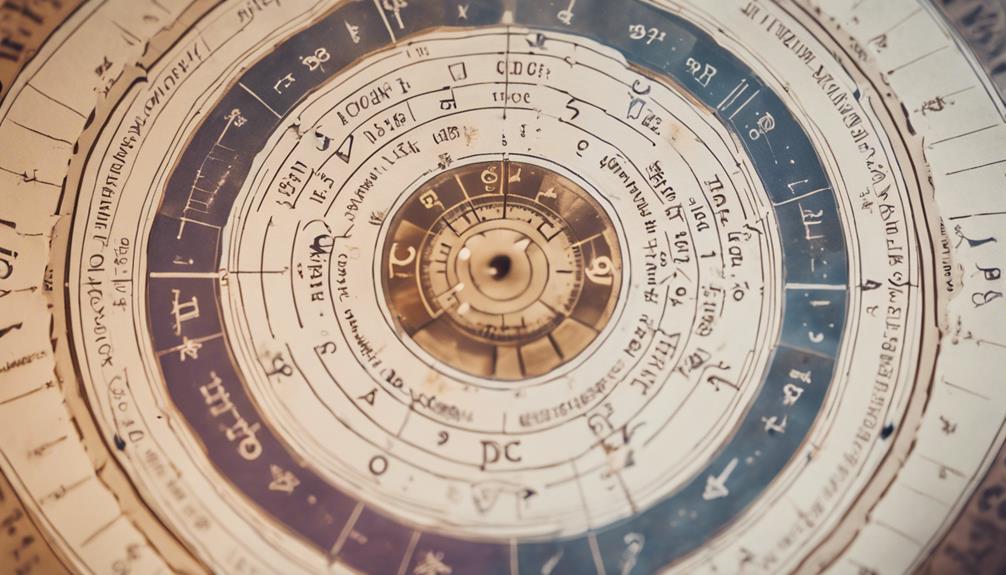What Do The 12 Houses Of Astrology Represent?

Astrology has been studied and practiced for centuries, and the 12 houses of astrology hold significant meaning and symbolism in this field. Each house represents a different area of life, and understanding their meanings can provide valuable insights into your personality and experiences.
Whether you're a beginner or an experienced practitioner, it's important to understand the interpretation of the 12 houses and their placement in your natal chart. In this section, we'll delve into the significance and symbolism of each house, providing you with a deeper understanding of astrology and how it can impact your life.
Understanding the 12 Astrological Houses
Each of the 12 astrological houses represents a different area of life and has its own specific meaning. Understanding the symbolism of each house can provide valuable insights into your personality, life experiences, and the events that may occur in your life.
| House Number | House Name | General Meaning |
|---|---|---|
| 1st House | Ascendant | Self-identity, appearance, first impression, health |
| 2nd House | House of Possessions | Money, possessions, values, self-worth, material goods |
| 3rd House | House of Communication | Communication, intellect, learning, siblings, neighbours |
| 4th House | House of Home and Family Life | Home, family, roots, emotional foundation, parents |
| 5th House | House of Pleasure | Creativity, self-expression, romance, children, leisure, hobbies |
| 6th House | House of Work and Health | Work, health, daily routine, habits, service to others |
| 7th House | House of Partnerships | Marriage, partnerships, relationships, business contacts |
| 8th House | House of Transformation | Transformation, shared resources, sexuality, death, rebirth, taxes, inheritance |
| 9th House | House of Higher Learning | Higher learning, philosophy, spirituality, travel, foreign cultures, religion |
| 10th House | House of Career | Career, social status, public image, legacy, ambition |
| 11th House | House of Friendships | Friendships, groups, social networking, humanitarianism, goals and aspirations |
| 12th House | House of the Unconscious | The unconscious, secrets, hidden enemies, self-sabotage, karma, past lives, retreat, solitude |
It's important to note that while each house has a general meaning, the specific interpretation can vary depending on the individual's birth chart and the position of planets in each house.
Conclusion
Understanding the 12 astrological houses can provide valuable insights into your life and personality. By exploring the symbolism of each house, you can gain a deeper understanding of your strengths, weaknesses, and potential challenges in different areas of life.
The First House: Self-Identity and Appearance
The first house is also known as the Ascendant, and it represents the way you present yourself to the world. This house governs your physical appearance, personal characteristics, and the way you express yourself in a social setting. It is the starting point of your astrological birth chart and sets the stage for the rest of the houses.
The first house is associated with the sign of Aries and is ruled by the planet Mars. Its placement in your birth chart determines how you approach life, your self-image, and your overall demeanor. The energy of this house is closely tied to your sense of self, and understanding its influence can provide insight into your personality traits and mannerisms.
If you have a strong first house, you likely exude confidence and possess a natural charm that draws people to you. However, if your first house is afflicted, you may struggle with insecurities or have difficulty expressing yourself authentically. It's important to remember that the energy of this house can change over time, depending on transits and personal growth.
Appearance in Astrology
The first house also governs your physical appearance and how you present yourself to the world. Your rising sign, which is determined by the placement of your Ascendant at the time of your birth, can give clues about your appearance and overall aesthetic. For example, a person with an Aries Ascendant may have a more angular, athletic build, while a person with a Pisces Ascendant may have a more ethereal, dreamy quality to their appearance.
However, it's important to note that astrology is not a determining factor in physical appearance, and other factors such as genetics and environment also play a significant role.
"The first house is the house of self-discovery."
Overall, the first house is a critical aspect of your astrological birth chart and provides key insights into your self-identity, appearance, and overall approach to life. By understanding the energy of this house and its placement in your chart, you can gain a deeper understanding of yourself and your unique path in the world.
The Second House: Finances and Material Possessions
The second house is often referred to as the house of possessions, as it is associated with material wealth and financial stability. It governs your values, personal possessions, and how you acquire and use resources to sustain yourself.
When planets are located in this house, they can indicate your financial status, the way you handle money, and your spending habits. The zodiac sign that rules over your second house can also provide insights into your values, priorities, and the things you deem important in life.
| Planet | Meaning |
|---|---|
| Venus | Associated with luxury and pleasure. Its placement in the second house can suggest a person who values material possessions and enjoys the finer things in life. |
| Mars | Can indicate a tendency to take risks with money or to be impulsive in spending. People with Mars in the second house often have a drive to acquire wealth and might be more aggressive in their approach to finances. |
| Jupiter | Commonly associated with abundance and expansion. When located in the second house, it can suggest a person who is fortunate or has an abundance of resources available to them. |
| Saturn | Can indicate struggles with money or a cautious approach to finances. People with Saturn in the second house may prioritize financial stability and security. |
If you're looking to improve your financial situation or strengthen your relationship with money, understanding the placement of planets in your second house can provide valuable insights. By acknowledging your values and taking steps to align your spending habits with your long-term goals, you can set yourself up for financial success.
The Third House: Communication and Learning
The third house is associated with communication, intellect, and learning. It's represented by the sign of Gemini and ruled by the planet Mercury. Understanding this house can provide insight into how you communicate and learn, as well as your relationships with siblings and neighbors.
Communication is a key theme of the third house. It includes both verbal and written forms of expression, as well as listening and comprehension skills. Those with a strong third house placement may be natural communicators, able to articulate their thoughts clearly and persuasively. They may also have a love of language, enjoying writing, reading, or learning new languages.
Learning and education are also important in the third house. This can include formal education, such as attending school or taking courses, as well as self-directed learning through books, podcasts, or other media. Those with a strong third house placement may be naturally curious and enjoy acquiring new knowledge and skills.
Third House in Relationships
The third house is associated with siblings, neighbors, and other close relationships. It can provide insight into how you communicate and connect with others, as well as any challenges you may face in these areas. Those with a strong third house placement may have close relationships with their siblings, or may form deep bonds with others in their community.
However, a poorly aspected third house can indicate challenges in communication and relationships. This can manifest as conflicts with siblings or neighbors, or difficulty expressing oneself in social situations.
Example Chart Placement
| Planet | Sign | House |
|---|---|---|
| Mars | Gemini | Third House |
In this example chart placement, Mars is in the sign of Gemini and the third house. This can indicate a strong drive to communicate and learn, with a quick wit and sharp intellect. The individual may excel in writing or public speaking, and may have close relationships with siblings or neighbors.
- Strong communication skills
- Quick thinking and intelligence
- Curiosity and love of learning
- Potential challenges in communication and relationships
"My siblings and I have always been very close, and we love to debate and discuss all sorts of topics. I've also always had a love of language and enjoy writing and public speaking."
The Fourth House: Home and Family Life
The fourth house in astrology is associated with one's home life, family, ancestry, and emotional foundation. It represents the roots that ground us and the people and places that provide us with security and comfort. Understanding the symbolism of the fourth house in your birth chart can provide valuable insights into your relationship with your family, your connection to your past, and your sense of belonging.
The fourth house is ruled by the sign of Cancer and the Moon, which are both associated with emotions, nurturing, and vulnerability. As such, the fourth house is often linked to one's childhood, mother, and maternal figures. It can also reveal important information about your relationship with your father or your parental dynamic as a whole.
| Key Themes of the Fourth House | Related Keywords |
|---|---|
| Family | family life, parents, siblings, home life, ancestors |
| Emotional Foundations | security, comfort, nurturing, attachment |
| Roots and Heritage | ancestry, traditions, customs, cultural identity |
When the fourth house is emphasized in your birth chart, you may have a strong emotional connection with your family and place a high value on creating a comfortable home environment. Alternatively, you may struggle with issues related to your family history, feeling disconnected from your roots, or finding it difficult to establish a sense of belonging.
Regardless of how the fourth house manifests in your life, exploring its symbolism can offer a deeper understanding of your past experiences and shape your future decisions and relationships.
FAQ: Common Questions About the 12 Astrological Houses
Understanding the astrological houses can be a complex and nuanced subject. Here are some common questions about the 12 astrological houses that may provide further insights into their meanings and significance.
What are the astrological house meanings?
The 12 astrological houses represent different aspects of life, with each house governing a specific area. The first house deals with self-identity, appearance, and personal characteristics. The second house is associated with finances, possessions, and personal values. The third house governs communication, intellect, and learning. The fourth house is related to home, family, roots, and emotional foundation. The fifth house represents creativity, love, and children. The sixth house is connected to health, work, and service. The seventh house governs partnerships, marriage, and other significant relationships. The eighth house represents transformation, shared resources, and intimacy. The ninth house is associated with travel, higher learning, and philosophical pursuits. The tenth house governs career, public reputation, and authority. The eleventh house is related to friendships, groups, and social causes. Finally, the twelfth house represents the unconscious, spiritual growth, and hidden fears or weaknesses.
How do the houses relate to the zodiac signs?
The zodiac signs are the 12 constellations that the Sun moves through during the year. Each sign has specific characteristics and traits, and they are associated with certain astrological houses. For example, Aries is associated with the first house, Taurus with the second, and Gemini with the third. The signs and houses work together to create unique placements in an individual's birth chart.
What do the house placements in my birth chart mean?
Your birth chart is a map of the sky at the moment you were born, and it contains information about the placements of the planets, signs, and houses. The house placements in your birth chart indicate where the different areas of life will be most prominent for you. For example, if you have many planets in the seventh house, relationships may be a significant part of your life. Understanding your birth chart can provide valuable insights into your personality, strengths, and challenges.
Can the houses change during my lifetime?
The houses do not change during your lifetime. However, the planets move through the houses and create different astrological transits and aspects. These movements can influence the areas of life associated with each house, creating unique experiences and challenges.
How can I use the houses to understand myself and my life?
Understanding the symbolism and meanings of the 12 astrological houses can provide valuable insights into your personality, relationships, career, and spirituality. By examining the placements of the planets and signs in your birth chart, you can gain a deeper understanding of your strengths, weaknesses, and life experiences. You can also use the houses to explore different areas of life and set intentions for personal growth.
🔴 Need Clarity on your Situation?



